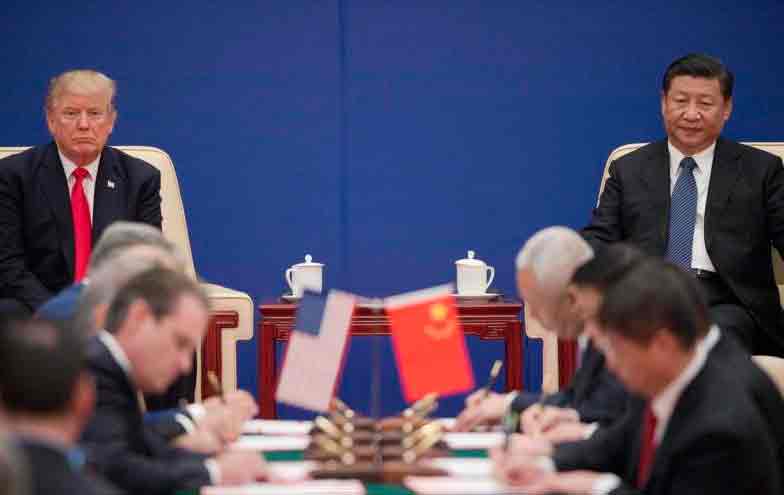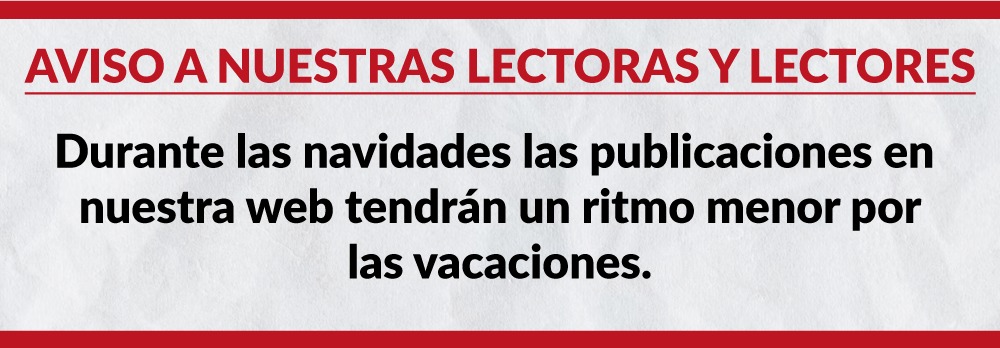Even though ten years have passed since the outbreak of the Great Recession of 2008, capitalism was not only unable to recover its balance, but it's heading to what may be a catastrophic new stage.
This threatening scenario looms over the negotiations between the two greatest world powers, which look more and more like a soap opera, due to its constant break- ups and reconciliations. On one side, the main characters feel the vertigo of a divorce that may start a commercial war of enormous proportions and, consequently, a collapse similar to the 1930’s. Secondary actors, such as the European Union or institutions as IMF, try to convince them to drop this idea. On the other, the possibility of losing world dominance pushes US imperialism to the path of economic nationalism, in the hopes of “Make(ing) America Great Again”. If the US threats are carried through, Chinese capitalism will be forced to answer due to the domestic difficulties it currently experiences.
Tariff Increases and protectionism
The plot thickens, due to the US government's decision of a 25% increase on tariffs on a number of chinese imports valued around 200 0000 million dollars, answered by China by doing the same on a volume of US imports which was valued around 60 0000 million dollars.
But the last and most significant chapter has had as a guest star the telecom giant Huawei, the crown jewel of the Chinese technological power, which has been blocked by a Trump’s administration emergency decree a decree that gives “veto power” over the “ properties of physical or juridical persons” implicated with the “designs, developments, products or supplements” destined to the american market that represent “unacceptable risk” to the national security of the country.
This torpedo against Huawei’s foreign dealings was answered with another chinese missile. Gao Feng, spokesperson for Trade, has announced the creation of a “untrustworthy entities” list to whom it would be forbidden to do business with. The use of military terminology is not overblown. The start of a protectionist action-reaction spiral, fueled by the increase in tariffs to up the price of imports from competitor countries and the direct prohibition of commercial relations with certain companies is, economically speaking, a declarationof war. Its consequences can be as, or more, devastating than an armed conflict.
The US defends its hegemony
Without ignoring Trump’s rowdy personality or his electoral ambitions, it would be a mistake to draw a perspective based on this factor. Marxism does not negate the role of the individual, but their genius or stupidity only have a decisive influence when they are in sintony with the social and economic context.
The arrogance of this soap opera cowboy is a reflection of the decline of US power. Wide economic areas, from Asia to Africa to Latin America, which historically had been exploited by the big north-american multinationals, are now under chinese imperialism’s control. A qualitative change in world relations has taken place, with dramatic economic and social consequences which are key to the present battle.
Trump does not exaggerate in relation to trade. US commercial deficit with China has surpassed 620 000 million dollars in 2018, representing a 23% increased compared with Obama’s administration. USA’s decline has been constant and unstoppable. If, after World War II, the United States exports were more than 20% of the rest of the world combined, today they are smaller than a tenth. Moreover, the “stars and stripes” collossus has been transformed into a dangerously indebted economy, and its biggest creditor is none other than China.
This decline has not yet caused the definitive transformation between quantity and quality., ispite its weaknesses, the US still maintains the position of first world power. The dollar is still the dominant currency in commercial exchange and its military superiority is indisputable. But behind Trump’s reaction we can see t US bourgeoisie’s anxiety, which is thinking about acting before it's too late.
Placing Huawei in their crosshairs is not a coincidence. It’s a cutting-edge company, operating in 170 countries, employing 180 000 workers and with an annual income higher than 40 000 million euros. In addition, it is owned by Ren Zhengfei- an ex military office who is a paradigmatic example of the capitalist conversion of the higher echelons of the bureaucracy that dominates the Chinese Communist Party (CCP)
The social and ideological consequences of the aforementioned events are extremely important. The Great Recession has weakened the powerful, and conservative, north-american middle class, whilst the “american dream” is dissipating. Inequality rises to new heights and it whips up mass consciousness.
Marxists are not alone in saying this: in the opinion of some bourgeois analysts, such as inSantander Bank, one of the problems that “the US still needs to face” is the “ideological radicalisation and polarisation”1, which shows itself in phenomena such as the rise of support for Bernie Sanders and the rise in support for the ideas of socialism, every day more and more popular with the youth in the US.
China will not give up the world market
China’s national industry has completely overcome the phase where it could only produce low quality and low-tech goods.Now, one of its flagship companies hits the symbol of American technology: Apple. In the first months of the present year, Huawey has displaced the “i”multinational from second to third place in world phone sales. Between 2018 and the first trimester of 2019, Samsung has kept and increased its leadership in mobile phone sales, reaching a volume of 19% of the market; Huawei has risen to second place reaching a volume of 14.3%; whilst Apple has retreated to the third position, going from 11.1% to 8.8%
To block Huawei is to strike at the heart of the Chinese regime’s strategic plan to weather the effects of the 2008 recession. In 2015, the Beijing’s government announced, with pomp and circumstance, the Made in China 2025 program, with the objective of optimising the national industry’s competitiveness against its western opponents. Years before, to ensure that chinese goods reach everywhere in the world, construction was started on the “Silk Road”, a transport network controlled by the Asian giant and that will encompass 65 countries- including various European nations like Greece or Italy- with a potential market exceeding 4000 million people.
Chinese capitalism has been preparing for years to face the tough times ahead, and that is also reflected in the political character of its regime. Xi Jinping has been consolidated as the “Strongman”, tasked with ruling his great nation with an iron hand. For the first time since Mao, a new paragraph in the Constitution has been written to recognise “Xi Jinping’s Thoughts about socialism with chinese characteristics for a New Epoch”. Obviously, no socialism is to be found in the Chinese regime.
Moreover, in spite of its commercial superavit and its place as the biggest exporter in the world, China’s economy is facing deep disturbances-The double digits rise in GDP rates are part of an ever more distant past.2018’ 6.6% grow in GDP has been the lowest figure in the last 30 years. Its debt is reaching similar levels to its north-american adversary, going from 140% of GDP in 2007 to 260% in 2018. The concerns about the fall in production and subsequent rise in unemployment have given rise to a new state investment program that will reach 3 billion dollars in the next few years.
The 2008 subprime housing bubbles have nothing on the current bubble in China. In fact, the government had to give up its initial plan of deflating this bubble, due to fear of causing a crisis, up to the point that chinese representatives have reduced the amount of liquid capital reserves that the banks need to ensure, lowering taxes and relaxing loan conditions.
The chinese leaders are also wary of the accumulated social tension. In the last period there has been a significant increase in strike action for higher wages. Wide layers of the working-class are rebelling against semi-slavery working conditions. One of the last examples was the tech sector workers’ “996.ICU” protest, with the name serving as a denunciations of the 9 a.m. to 9 p.m. workday, 6 days a week, which causes a mental and physical exhaustion that can take you to the Intensive Care Unit- ICU.
Capitalism’s veins are coagulated
From an historical and international perspective, capitalism is going through one of its most critical moments. Its material base has been dilapidated by an overproduction crisis and an amount of debt that can block its main financial arteries.
The breaking off old agreements marks international relationships, creating havoc everywhere- just look at the consequences of Brexit.
And, in the arena of class struggle, the masses, despite the past defeats and the absence of a revolutionary leadership that matches their spirit, rise up in country after country, showing no signs of a truce. The Arab Spring, thought to be dead and buried, flowers again in Sudan and Argelia. The same with the mass mobilisations in Latin America, especially in Brazil and Argentina against Bolsonaro and Macri.
The capitalist world still survives, but it has suffered deep and traumatic transformations. Three decades ago, China started its conversion into the motor of global growth, in a process that culminated in its capitalist restoration and the death of the planned economy born from the 1949 revolution. The stalinist bureaucracy in charge of the state became part of the new bourgeoisie.
Then president Bill Clinton did not hide his excitement when he met China’s prime minister Zhu Rhongji: “The United States firmly support the Chinese’s People’s Republic access to the WTO starting in 1999”2. In the present day, in a“rainy day” period, north-american capitalism drastically changed its opinion, declaring through one of its spokespersons that “the US made a mistake when we supported the entrance of China in the WTO”3.
Facing with the current situation, both superpowers can straighten their embrace of economic nationalism and start an open trade war. If this happens, the cure will be worse than the disease. World markets are like a living organism, and to dismember it might cause a catastrophe. Trotsky’s affirmation that “....the world economy subordinated the national market” is now truer than ever4..
The trade war between the US and China is reverberating all across the world. Companies from every part of the globe- such as the german Infcom Technologies, the japanese Panasonic and Toshiba, the british ARM or big telecom such as Vodafone- had to choose sides, and they choose Trump even though they had to give up very tempting dealings with Huawei.
We can only wonder about what is going to happen to the price of “rare earths”, the valuable minerals that are essential for almost every technological product, seen as China controls 83% of the world production, but the effects of this war go beyond telecommunications and informatics,
Caterpillar, the behemoth of industrial equipment, lost 5% of its value in the stock exchange due to fears about its 19 factories in China, and Nike is shaking due to the fact that 21% of its production takes place there (with 21% in Indonesia and the remaining 47% in Vietnam).
More than 170 shoe-retailers have sent the following letter to Trump:”As leading American footwear companies, brands and retailers, with hundreds of thousands of employees across the U.S., we write to ask that you immediately remove footwear from the most recent Section 301 list published by the United States Trade Representative on May 13, 2019. The proposed additional tariff of 25 percent on footwear would be catastrophic for our consumers, our companies, and the American economy as a whole.” The stock exchanges also have an opinion, and their opinion can effect important backlashes”
Marxism has said, for a while, that the return to economic nationalism is an expression of the organic decadence of capitalism: “The progressive task of how to adopt the arena of economic and social relations to the new technology is turned upside down, and is made to seem a problem of how to restrain and cut down productive forces so as to fit them to the old national arena and to the old social relations. (....)The ultra-modern economic nationalism is irrevocably doomed by its own reactionary character; it retards and lowers the productive forces of man.”
We only have to observe the impressive development of science, technology, transportation and large-scale production to understand that, if the productive forces were under the democratic, harmonious and collaborative control of the working-class, the nightmares of inequality, chronic unemployment, poverty, imperialist war and environmental destruction could be easily wiped away.
Notes
1.https://es.portal.santandertrade.com/analizar-mercados/estados-unidos/politica-y-economia
2.Firmado un acuerdo agrícola que abre camino a China hacia la OMC, 10 de abril de 1999, EL MUNDO- New agricultural agreement signed, opening China’s path towards WTO, 10th of April, 1999. El Mundo
3.The history of how the US seduced China to the free market and now closes the door with the veto to Huawey. 22nd MAy of 2019, El Diario.
4.Nationalism and Economic Life, Leon Trostky, 30th of November, 1933
Nacionalismo económico y guerra comercial. El capitalismo ante el abismo





















































